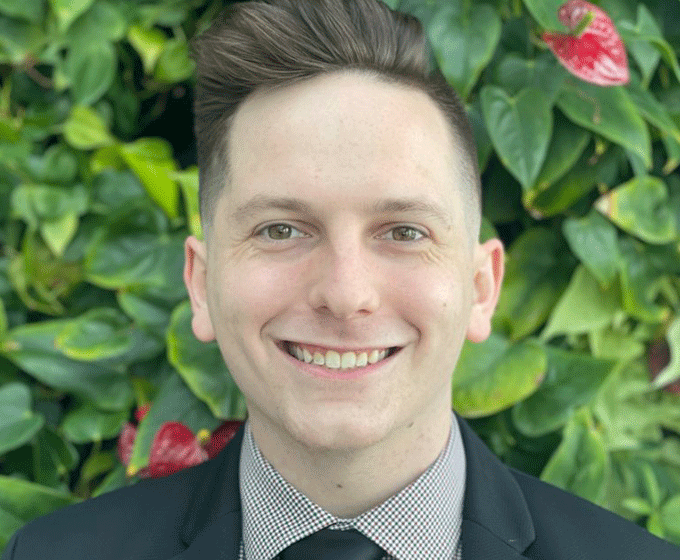
JANUARY 10, 2022 — When Joseph Lindsey ’18 embarked on a new job with the Centers for Disease Control and Prevention (CDC) in New York City, he was ready to put his degrees to work on important, possibly groundbreaking medical research.
Then, he saw his assignment: the Bureau of Tuberculosis Control at the New York City Department of Health and Mental Hygiene.
“I got my assignment and I thought, what do they mean TB? In the United States?” he recalled. “But I started looking at the TB rates in New York City and they are wild. It’s very endemic.”
His initial dismay quickly turned into stress as he dove into a niche part of the disease — multidrug and extremely drug-resistant tuberculosis (MDR/XDR-TB). This crash-course in tuberculosis, drug susceptibility testing and genomic sequencing—done remotely due to the COVID-19 pandemic—taught Lindsey the ins and outs of the disease and how to interpret bacteriological testing.
Lindsey’s day-to-day work includes epidemiological surveillance, specifically pertaining to multidrug-resistant tuberculosis, creating policy and procedures for area clinics that treat TB, and working in one of the Bureau’s Chest Clinics performing HIV testing and assisting with telehealth enrollment.
“It was very difficult at first,” Lindsey said. “But I felt very supported by my supervisors and mentors, and now that I’m in the thick of it, I am very happy and have learned a tremendous amount.”
Lindsey never imagined he’d be living in New York and working for the CDC when he entered UTSA with plans to be a doctor. He enrolled in UTSA’s public health program, assuming it was pre-med adjacent, but soon realized the scope of public health and all it had to offer.
“The reason I wanted to go into medicine was to help people,” Lindsey said. “Medicine is very much focused on helping that one person in front of you. Public health addresses everything on a systemic level and I really liked that idea.”
Once he completed his B.S. in public health from UTSA, Lindsey earned his M.P.H. focused in community-oriented primary care from George Washington University. After graduating, he discovered the CDC Public Health Associate Program, a two-year paid training program to gain hands-on experience that serves as the foundation for a public health career.
Public health’s upstream approach to preventing disease stays in Lindsey’s mind daily as he touches on all aspects of tuberculosis prevention at the CDC and the New York City Department of Health and Mental Hygiene. Although he plans on pursuing physician assistant studies in the future, he cautions anyone entering public health with medicine in mind.
“Public health is more than a stepping stone to medicine — it’s a field within itself,” Lindsey said. “If you do want to go into medicine though, translate your knowledge in terms of the different levels of prevention, rather than staying focused on treatment, to how you as a provider can become a public health-based practitioner.”
Lindsey’s message is particularly timely for the newly-formed College for Health, Community and Policy at UTSA. Although he graduated before its formation, his message of practicing medicine for the betterment of the community is one of the college’s core missions.
“Something I did a lot in my program is community-based participatory research and that is really what opened my eyes to just how important it is to involve the community in every single decision-making process,” Lindsey said. “They need to be the number one stakeholder in any decision that’s made for their health.”
UTSA Today is produced by University Communications and Marketing, the official news source of The University of Texas at San Antonio. Send your feedback to news@utsa.edu. Keep up-to-date on UTSA news by visiting UTSA Today. Connect with UTSA online at Facebook, Twitter, Youtube and Instagram.
Move In To COLFA is strongly recommended for new students in COLFA. It gives you the chance to learn about the Student Success Center, campus resources and meet new friends!
Academic Classroom: Lecture Hall (MH 2.01.10,) McKinney Humanities BldgWe invite you to join us for Birds Up! Downtown, an exciting welcome back event designed to connect students with the different departments at the Downtown Campus. Students will have the opportunity to learn about some of the departments on campus, gain access to different resources, and collect some giveaways!
Bill Miller PlazaJoin us for an intimate evening of cocktails, conversation, and culinary inspiration with Pati Jinich, Emmy-nominated chef and James Beard Award-winning author. Enjoy light bites and signature drinks in the warm, modern setting of Mezquite as Pati connects with guests over her passion for Mexican cuisine and storytelling.
Mezquite Restaurant in Pullman Market, 221 Newell Ave., San Antonio 78215From inspired courses to thoughtful pairings and a rich sense of community, the Ven a Comer Signature Dinner is a night of shared meals, shared stories, and unforgettable flavor.
Stable Hall (Pear Brewery), 307 Pearl Pkwy, San Antonio 78215Come and celebrate this year's homecoming at the Downtown Campus with food, games, giveaways, music, and more. We look forward to seeing your Roadrunner Spirit!
Bill Miller PlazaThe University of Texas at San Antonio is dedicated to the advancement of knowledge through research and discovery, teaching and learning, community engagement and public service. As an institution of access and excellence, UTSA embraces multicultural traditions and serves as a center for intellectual and creative resources as well as a catalyst for socioeconomic development and the commercialization of intellectual property - for Texas, the nation and the world.
To be a premier public research university, providing access to educational excellence and preparing citizen leaders for the global environment.
We encourage an environment of dialogue and discovery, where integrity, excellence, respect, collaboration and innovation are fostered.